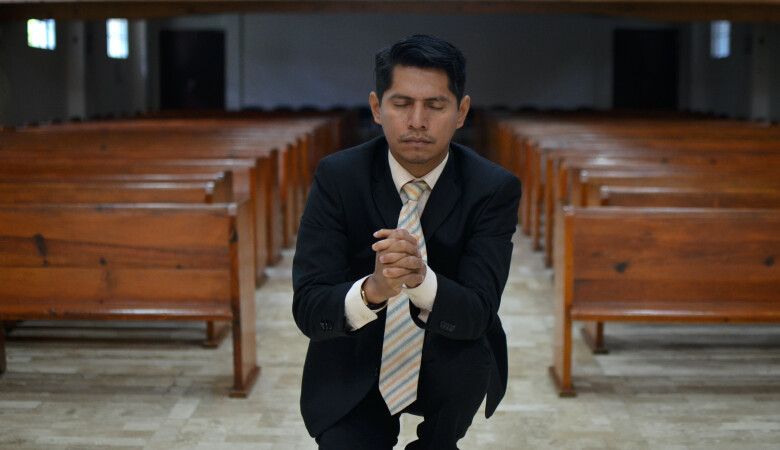The Call of Abram: The Ancient Origin of Missions
November 21, 1999 | Andy Davis
Genesis 12:1-20
Pastor Andy Davis preaches a verse-by-verse expository sermon on Genesis 12. The main subject of the sermon is the divine reason that we do missions today.
- SERMON TRANSCRIPT -
Introduction
Good morning. Why don't you take your Bibles and open to Genesis Chapter 12. This morning with God's help, we are going to finish our series in Genesis. There are 50 some odd chapters in Genesis, we are not going to ignore them, but maybe at some point as the Lord provides, we will come back to them. After this week, we are going to look at some sermons in Isaiah in preparation for Christmas, and then we will go in a different direction in the new year. We have learned a great deal haven't we, in studying through these first 12 chapters of Genesis. I think if I went through them again, I might do them differently. There are so many themes, there are so many rich themes that are in Genesis 12, but today we are going to look at the ancient origin of modern missions in the call of Abram.
The Eternal Gospel: The Knowledge of God to the Ends of the Earth
God’s Timeless Plan
The eternal gospel, which is the knowledge of God to the ends of the earth, has been God's eternal plan. This is not something that He cooked up at the last minute, it is not something that he thought about under the pressure of the moment, it is something that he had worked out before the foundation of the world. He knew exactly what he would do, and God's methods have always been to call single individuals, simple people to obedience, the obedience that comes from faith, and then out of that single life to do great things. That is what he does with Abram, who is called in Romans our father in faith.
Now, there is in our modern culture somewhat of a hostility toward missions, isn't there? A sense in which it is somewhat like cultural imperialism, we feel that we have all the answers and we have got to go to those poor people and bring them into our way of thinking. It is not that way at all. The eternal gospel was committed to us, we are stewards of that gospel and we are seeking to pass it on under His command. And so, the command to go to the ends of the earth is not something that we cooked up and it brings no glory to ourselves, but only glory to the name of Jesus Christ.
I have been praying for this sermon all week and it is my prayer that there is a group of people here, I don't know who they are but God knows, who are going to be changed by what I have to say today. I feel that God may change your whole life. In fact, you might have come in here, you think you were going to do X, Y and Z with your life, and as a result of what you hear in the word today, everything changes. That is my prayer because I am laying my cards right out on the table, that is my intention and my prayer, I want something to change. There is a fork in the road and after hearing the sermon today, this was it. It happened to me. I heard a message from the Lord and my life changed. That is my desire for you. I would like you to be like Abraham and follow in the footsteps of his faith. The root of modern missions is the eternal gospel, which proclaims salvation in the name of the eternal one, and we are going to see the root of that in Genesis 12, 1 through 9. Let's look at these verses together.
God’s Call on Abram
Beginning at Verse 1, "The Lord had said to Abram, ‘Leave your country, your people and your father's household and go to the land I will show you. I will make you into a great nation and I will bless you; I will make your name great, and you will be a blessing. I will bless those who bless you, and whoever curses you I will curse; and all peoples on earth will be blessed through you.’ So Abram left, as the Lord had told him; and Lot went with him. Abram was seventy-five years old when he set out from Haran. He took his wife Sarai, his nephew Lot, all the possessions they had accumulated and the people they had acquired in Haran, and they set out for the land of Canaan, and they arrived there. Abram traveled through the land as far as the sight of the great tree of Moreh at Shechem. At that time the Canaanites were in the land. The Lord appeared to Abram and said, ‘To your offspring I will give this land.’ So he built an altar there to the Lord, who had appeared to him. From there he went on toward the hills east of Bethel and pitched his tent, with Bethel on the west and Ai on the east. There he built an altar to the Lord and called on the name of the Lord. Then Abram set out and continued toward the Negev."
The Context
In order to understand these verses, these nine verses, we have to set it in context. And what is the context? The first context to understand is who it is that called Abram. It is the Lord, the Creator of the ends of the earth that called him. This is a good time for us to understand that context. Listen to the words of John Stott, "The Lord who chose and called Abraham is the same Lord who, in the beginning, created the heavens and the earth and who climaxed his creative work by making man and woman unique creatures in his own likeness. In other words, we should never allow ourselves to forget that the Bible begins with the universe, not with the planet earth; then with the earth, not with Palestine; then with Adam the father of the human race, not with Abraham the father of the chosen race. Since, then, God is the creator of the universe, the earth and all mankind, we must never demote him to the status of a tribal deity or a petty godling like Chemosh the god of the Moabites (or Molech) the god of the Ammonites, or Baal the male deity; or Ashtoreth the female deity, of the Canaanites. Nor must we suppose that God chose Abraham and his descendants because he had lost interest in other people or had given them up. Election is not a synonym for elitism. On the contrary, God chose one man and his family in order, through them, to bless all the families of the earth.” That was God’s intention. Our faith is a universal faith, committed to us by the Creator of the ends of the earth, which we understood from the very beginning of the book, Genesis Chapter 1.
And so, we come to the biblical context, and this is a good chance for us to look back over what we've learned over the last 11 weeks. In Genesis 1, God created the heavens and the earth. This is the first great act of God's sovereign rule. He is the creator of the ends of the earth, and then the rest of the Bible reveals Him in His second capacity, the redeemer of the human race. God the creator, God the redeemer, one of them done in seven days to His glory, the rest worked out through human history, every step of human history for a certain purpose. Everything right on schedule to the praise of God, isn't that great?
And so, God has been working out His plan, and we saw his plan, it was not changed or marred or affected by the fall of man in Genesis 3, however tragic that was, the fall of man brought in sin and with sin came death. But in the prophecy that God had given to Eve, that her seed, namely Jesus Christ would crush the serpent's head, we had the first glimmer of God as redeemer, and we have in our passage here the second clear word of the redemption of the world. In this case, that the serpent slayer that we have been waiting for all these chapters is going to be a descendant of Abraham, he's going to be what we call Jewish.
In Chapters 4 through 11 in Genesis, we have just seen the devastation of sin, we saw Cain killing his brother, Abel, and we saw the development of cities that were in wickedness against God, we saw the calling out of that elect line in Genesis 5, and then the wickedness of the earth having spread to such a point that every thought and every imagination of human hearts, all the time was only evil. And so, the flood came and yet God chose one family, Noah, his three sons and their wives, and saved the human race through that one family, and not only them, but the animals that breathed there through their nostrils, the flood of Noah. God purified the world, and when Noah came out of that ark, God gave him the exact same command that had been given to Adam. And what was that command? Fill the earth, subdue it, rule over it. And why? For the earth will be filled with the knowledge of the glory of the Lord as the waters cover the sea.
Now, back at creation, as I've told you, the earth was already filled with the glory of the Lord, but not the knowledge of the glory of the Lord. God scattered the nations at the Tower of Babel, as you'll remember, sent them to the places he had assigned for them, they didn't want to go, did they? That is why they built the tower, that is why they built the city. God spread them all over the surface of the earth, and in Acts 17, Verse 26, Paul tells us that they went to the places that God had assigned for them and lived in the way that God had assigned for them. He knew that after the time of Christ, he would be sending missionaries to go out and reach them one people group at a time with the gospel, and that is exactly what is going on to the glory and to the praise of His name. And so, we have here in Genesis 12, the calling of Abram, the first clear mission call to leave your country and your people.
Abram’s Circumstances
Now, what were Abram's circumstances? He was in Ur of the Chaldeans when he was called. That may be a little bit unclear from the context here, but that's exactly when the call came. If you put the account together with some other verses that we learnt from the scripture, and that's a key principle in scripture interpretation, scripture interprets scripture. We put them together, they never contradict each other but they shed new light, and so Nehemiah many, many years later prayed looking backward and in Nehemiah 9:7 he prayed to the Lord and said, "You are the Lord God who chose Abram and brought him out of Ur of the Chaldeans and named him Abraham." Very important. The call came to Abraham when he lived in Ur of the Chaldeans, not when he was in Haran. Stephen testified to this as well, in his sermon in Acts 7, right before his death by martyrdom, right before he was stoned for his witness to Jesus Christ, he said this, Acts 7, Verse 2, "The God of glory appeared to our father Abraham while he was still in Mesopotamia, before he lived in Haran." Could it be any clearer?
While he was still in Mesopotamia before he lived in Haran, leave your country and your people and go to the land I will show you. That was his context, he was living in Ur. Now, where is Ur of the Chaldeans? Well, modern archaeology, the archaeologists feel that they've found it, they are pretty sure it is located 225 miles southeast of Baghdad in the modern country of Iraq. Well, if you think about recent history, what went on about 200 or 300 miles south of Baghdad recently? Wasn't there a war there? That's exactly where Operation Desert Shield and Desert Storm were fought, in that same area around Kuwait. Mesopotamia is the region between the two rivers, the Tigris and Euphrates, and that whole modern country is called Iraq. That is about where he lived. It was a powerful city, a city with a great population, advanced culture, it was the center of the southern Babylonian people, and together with the other peoples of that region, they would eventually make the great and powerful Babylonian empire. It was an important place. He lived in an important place.
Now, what about his people? His people were Shemites, is that what we call it? We call it Semites, descendants of Shem. Also, he was called a Hebrew. In Genesis 14:13, it calls him Abraham or Abram, the Hebrew, that means he was a descendant of Eber, the words meaning the same thing. So, he's in that line, that Godly elect line from Shem through Eber. Now, his father's household, Terah, Nahor and Haran, they are all related, perhaps at that time also Shem, Arpachshad, Shelah, Eber, Reu, and Serug were still alive. We don't really know for sure, but they may well have been, if you would just add up the years in the genealogy, it is possible that they were still alive.
So, when God calls him to leave his household, that is this whole group of people, at least this much is true, that Terah was there. Now, what about Terah? Do we know anything about Terah? Yes, we do. We know that he was a pagan. He was a polytheist. That is very significant, isn't it? Well, how in the world do we know that? We don't know it from this scripture but as I told you, scripture interprets scripture, and Joshua is the one who gives us the information about Terah. In Joshua 24:2, “Joshua said to all the people, ‘This is what the Lord, the God of Israel, says: “Long ago your forefathers, including Terah the father of Abraham and Nahor, lived beyond the River and worshiped other gods.”’"
Terah, Abram's father worshiped other gods, the local deities, he was involved in this, and isn't this tragic? Just an “x” number of years after the flood, Noah steps off that ark and he builds an altar to the God of creation, the God who set the rainbow in the sky. He worshipped Him in a pure way, but just a certain number of generations later, they are already into polytheism, worshiping the gods of the region. That was Terah. Now the Bible doesn't say that Abram was into that, that he himself was a polytheist, but his father was. And so, God gives him a call and God speaks clearly to him.
God’s Call
Do you know that God speaks? Are you aware of that? If you are a Christian, you know that God speaks. He communicates. Next week, I'm going to preach in Isaiah Chapter 1. Isaiah 1, Verse 2, "Hear, O heavens! Listen, O earth! For the Lord has spoken." God speaks. Who hears when God speaks? The believers hear. The believers, they can hear when God speaks. In John 10:27, Jesus who is our Good Shepherd said, "My sheep listen to my voice. I know them, and they follow me. I give them eternal life, and they will never perish; no one can snatch them out of my hand." If you are a child of God, you hear that voice and you follow. And Abram was a child of God, and he heard the voice of God and he followed.
This call would shape the rest of Abram's life, nothing would ever be the same after the call came, and after he obeyed. Now, it is fascinating to me how God, when He comes to us and when He calls, He asks everything of us, doesn't He? He asks it all and offers everything to us as well, isn't that Jesus? Isn't that Jesus in the New Testament? He said to the rich young ruler, sell it all. Give it all away, follow me, and you'll have treasure in heaven. That is the Jesus I know, He is willing to command incredible things of us. Take up your cross, that instrument of execution every day and follow me, and I'll give you eternal life. I'll give you everything. See, this is the same God, the consistency of scripture, God asks everything and offers everything.
And so, He says leave it all, leave your country, leave your people, leave your father's household, leave everything you know, leave it all behind and follow me to the place I will show you, I'll tell you more about it later. Just obey me. And that was the call, leave your country, leave behind everything and follow in footsteps of faith, follow an invisible God and I'll give you marching orders when you need them. When you need to hear from me, I will talk to you, and you'll have everything you need to do when you follow my voice, and that is the life of faith. And so that was Abram's call. And this began when he obeyed, this began Abram's life of wandering. He was a wanderer. Do you know that? Look in Verse 4, so Abram left, Verse 6, Abram traveled through the land, Verse 8, from there he went on toward the hills east of Bethel and pitched his tent, the tent, by the way, is a symbol of his wandering. There's no solid foundation. You are just moving from place to place.
In Verse 9, then Abram set out and continued toward the Negev. Verse 10, Abram went down to Egypt to live there for a while. Chapter 13, Verse 1, Abram went up from Egypt to the Negev. I thought in preparation for this sermon, I would follow every place that it says that he went and I got worn out, I didn't have time, time presses on you when you're a pastor and I said I've got to leave that behind. What I will do is tell them he wandered a lot of places, he really did, he lived a life of faith and he was never set in one place. He was following the call of God from place to place. In Genesis 20, Verse 13, Abraham was looking back at his life. At this point, his name was called Abraham, and he looked back on his life and he said, when it all began, “when God had me wander from my father's household,” that's the word he chose, when He had me wander. What is wandering? It's kind of moving around not knowing where you are going.
Abram was a wanderer by faith, it wasn't without purpose though. His wandering was not without purpose, there was a purpose. He just didn't know where he was going. That is a life of faith. Hebrews 11 talks about that. Hebrews 11, Verse 8, and following “By faith Abraham, when called to go to a place he would later receive as his inheritance, obeyed and went, even though he did not know where he was going. By faith he made his home in the promised land like a stranger in a foreign country; he lived in tents, as did Isaac and Jacob, who were heirs with him of the same promise.” That's the kind of life he lived. It was a life of faith. Not knowing where he was going. Holding on to nothing in this world.
God’s Promises to Abram
Three Promises
So, God asks everything of us, doesn't he? But he offers everything, too. And what did he offer to Abraham here in this call? Look at it, in Verses 2 and 3. God makes some promises to him. Three promises in particular. He says, “I will make you into a great nation, and I will bless you, and I will make your name great.” Three promises.
First one, I will make you into a great nation. Do you think that was important to Abram? Oh yes, it was. And the more you go on with Abram, the more you see how much he wanted this, how much he wanted a son, how much he wanted descendants, how important that was to him, the passion of his heart, and that's familiar to us, isn't it? That we might have children, perhaps a legacy to leave behind. That's important. It was the deepest desire, earthly desire of Abram's heart.
Ultimately, Abram's name would be changed to Abraham, the father of many nations. Isn't that incredible? Even though he had no child at this point, nothing but God made him a promise, “I will make you into a great nation.” And the second promise, he says, “I will bless you, I will bless you.” Now, we talked about blessing recently, remember when Noah stepped off the Ark, God blessed him, and we talked about blessing, but it's good to remind ourselves what a blessing is from God. It means that God's creativity and his resources and his power and sovereignty are directed toward your benefit, isn't that something? To think that all that God is, is directed toward good things for you.
He said, "I'll bless you." I love the words in the later covenant that came to Abram's descendants. In Deuteronomy 28:3-8, Moses was talking about the blessings of God, and this is what he said, "You will be blessed in the city and blessed in the country. The fruit of your womb will be blessed, and the crops of your land and the young of your livestock−the calves of your herds and the lambs of your flocks. Your basket and your kneading trough will be blessed. You will be blessed when you come in and blessed when you go out. The Lord will grant that the enemies who rise up against you will be defeated before you. They will come at you from one direction but flee from you in seven. The Lord will send a blessing on your barns and on everything you put your hand to. The Lord your God will bless you in the land he is giving you." Isn't that incredible? Comprehensive blessing.
Well, it is incredible, but it's not comprehensive, I'll give you a comprehensive blessing. How about this one? Ephesians Chapter 1, Verses 3 and 4, "Praise be to the God and Father of our Lord Jesus Christ, who has blessed us in the heavenly realms with every spiritual blessing in Christ." Now that's a comprehensive blessing, and it comes to anyone who believes in Jesus Christ, every spiritual blessing that God has to give you is given to you in Jesus Christ. I will bless you he says. And then thirdly, he says, I will make your name great. Isn't this interesting? Do you remember last week? What did we talk about last week? Genesis 11, Tower of Babel. What was it that motivated the builders of the Tower of Babel? Their reputation, they wanted to make a name for themselves, to have the city with the tallest tower. It goes on today, I don't know how long it's going to take Chicago to reclaim that title, but they will get it, they will get it for a little while until some other city takes it from them.
Making a name for themselves. Making a reputation for themselves, the very same thing we saw in Genesis 6:4 right before the flood. Oh, how I wish the English translations would do Genesis 6:4 properly. Those were not men of renown, they were men of the name. Men who wanted to make a name for themselves. That's what the Hebrew says. Isn't that the passion of a pagan heart? Make a name for yourself. And God says, "No, no, Abram, I'll make a name for you. I'll make a name for you. If you humble yourself before me and if you obey me, I will lift you up, and I will make a name for you that will last."
That's fascinating to me. The same promise was given to David, King David. Nathan the prophet went to him. Now then tell my servant, David, this is what the Lord Almighty says, “I took you from the pasture and from following the flock to be ruler over my people, Israel, I've been with you everywhere you've gone, I've cut off all your enemies from before you.” Doesn't that sound familiar? Similar to Abram, cut off all your enemies from before you and now I will make your name great, like the names of the greatest men on earth. That's what God did for David. He does the same thing for Abram. You know what's beautiful? He does all of that for us in Jesus Christ. Any one of you who is a believer in Jesus Christ, think about this. How much better is what I'm about to tell you than to have a reputation or a name here on earth, this is what it says, Jesus is speaking now, Revelation 3:5, Jesus says, of your name, “I will never blot out his name from the book of life, but will acknowledge his name” the name of a believer, “before my father and His angels.” I will speak your name to my Father.
To have Jesus speak your name before the throne of grace. Isn't that something? That is far better than any name or reputation here on Earth. But there is a name that is above every name. Isn't there? A name higher than the name of Abram, a name higher than the name of David, a name higher than any of your names, and that name is the name of Jesus Christ. That position has been taken, it is filled. At the name of Jesus, every knee shall bow in heaven and on earth, and under the earth, and every tongue confess that Jesus Christ is Lord to the glory of God the Father. Jesus has the name that is above every name. His name is the highest, and yet God promises to make a name for Abram.
And so, 4,000 years later, some Gentile pastor standing up some miles distant, and I'm speaking about this man, Abram, 4,000 years later. How many of Abram's contemporaries in Ur of the Chaldeans do you know? Can you list any of their names, some of his neighbors and people down the road? That was 4,000 years ago in Ur of the Chaldeans, but 4,000 years later, we are still talking about Abram. God keeps his promises. Doesn't he? We're still talking about David as well. God keeps his promises. That's the way He is.
The Purpose of the Promises
But all of this lavish blessing is for a purpose, isn't it? It's not just so that Abram can be happy and have a blessed life, it's so that he will be a blessing to the nations. God's mind is on the nations, it's on the peoples. And so, he blesses for a purpose. I will bless you so that you will be a blessing. Abram's call was with a purpose. The purpose was universal, worldwide, to bless the nations through him.
The Promises Extended
I will bless those who bless you, and whoever curses you, I will curse, and all peoples on earth will be blessed through you. All peoples, all nations, all tribes, all families. That's the way we understand that. Abram was called for that special purpose, that God would bless all nations through him.
Now, the blessing would come in proportion or in connection to how you related to Abram. If you blessed Abram, you would get a blessing, if you cursed Abram, you would be cursed. It's just that simple. God was going to uphold Abram, but ultimately the blessing comes through Abram's physical lineage, doesn't it? Descendants. He had a son, Isaac. Isaac had a son, Jacob. Jacob had 12 sons. One of the sons was Judah, and so on down it comes through Jesus Christ. This promise, Genesis 12:3, another clear indication of the coming of Jesus Christ, because through Abram's descendants, through his seed, all nations on earth are blessed through faith in Christ.
The apostle Paul, that great Old Testament scholar, picked up on this in Galatians 3, Verse 8, “The Scripture foresaw that God would justify the Gentiles by faith, and announced the Gospel in advance to Abraham: ‘All nations will be blessed through you.’” So, you know what Paul said? He said Genesis 12:3 was the gospel early on, it was an early proclamation of the gospel, and the gospel saw that the Gentiles would be justified by faith. In Galatians 3:16, “The promises were spoken to Abraham and to his seed. The Scripture does not say ‘and to seeds,’ meaning many people, but ‘and to your seed,’ meaning one person who is Christ.” Clearly, in the apostle Paul's mind in Galatians, this is speaking of Jesus Christ, and that's the blessing of Abraham that comes to all the nations through faith in Christ.
This is the second clear promise given to us of the serpent slayer, isn't it? We got the first one in Genesis 3:15. Remember what God said to the serpent? I will put enmity between you and the woman, and between your seed and her seed. You will bruise his heel and he will what, crush your head. That is Jesus Christ, the serpent slayer. And so, we get the second promise that the serpent slayer would come through Abram. In Verses 4 through 9, we see Abraham's delayed obedience and his walk by faith. Do you know there is a marriage between faith and obedience that cannot be separated? Faith produces obedience. Saving faith produces an obedient lifestyle. There is no separation between Jesus as Savior and Jesus as Lord. It doesn't work that way.
Jesus is, He is the savior, He is Lord. And there is a marriage between faith and obedience. In Verse 4, Abram left as the Lord had told him, just like his ancestor, Noah, he walked by faith step by step in obedience to Him. True faith always results in radical obedience. God willing, as we turn into the new year and the millennium comes, if the Lord does not return, and we can talk about that, I don't know when we are going to get another chance on Wednesdays to discuss eschatology, but we'll do that at some point. But if the Lord does not return and if he gives us opportunity, we will study Romans. In Romans Chapter 1, Verse 5, Paul's apostleship was to call people from among all the Gentiles, that's us, to the obedience that comes from faith. And he finished the book, Romans 16, Verse 26, “so that all nations might believe and obey Him.” Do you see? Beginning and end, faith and obedience married together, they cannot be separated.
Abram’s [Delayed] Obedience and Walk by Faith
And so, Abraham is our father in faith. He set the example, he moved out. But obedience sometimes grows slowly, grows gradually. Did he move out from Ur of the Chaldeans? Well, yes, he did. In Genesis 11:31, we read it last week, “Together, they set out from Ur of the Chaldeans to go to Canaan.” They are on the way to Canaan, and what happened on their way to Canaan? Haran happened. They stopped in a place called Haran and they stayed there for a little while. Now, what happened in Haran? They got off the track, Abraham got off the track. He should have kept going on to Canaan, but he stopped in Haran and he settled there. That's a key word, Genesis 11:31, they “settled” there. This is disobedience, folks. When God calls you to go, you need to go all the way to where he has called you to go. It's not enough to just start, God has destined that you finish the race, not just that you start, and so he should have kept going, but he didn't.
And why did he? I don't know, but I'm beginning to think that he was waiting for his father to die. He was thinking, I need to stay with my father, that polytheist, I need to just be with him and spend time with him, etcetera. There was a time when Jesus was going around and challenging disciples to follow Him. Follow me, he said, follow me. And one of them said first let me go and bury my father. That's a Semitic expression for saying, "I need to take care of my parents and when that's all settled, maybe I'll have time to follow you."
So, he gives me a chance to kind of work things out here before I follow you, alright? I need to arrange some things. And Jesus said follow me and let the dead bury their own dead. That's a good word for Abram here. Somebody will take care of Terah, that polytheist, you follow me, alright? You follow me. And Jesus said in Matthew 10:37, "Anyone who loves his father or mother more than me is not worthy of me." Follow me he says. God had called him to leave his idolatrous father, Abram perhaps wanted to wait till his father died. Finally, Abram left and his father died in Haran 60 years after Abram left. Sixty years. You count it up, you look at the genealogy, 60 years later, that's when that man finally died. He would have missed it all, he would have missed the whole thing, the birth of Isaac, that miracle. Terah died 35 years after Isaac was born. He would have missed the whole thing.
Sometimes God calls you to make a decisive break and go somewhere, a place you had never even imagined, to break with the past, even to break with loved ones, and go somewhere to serve him. Don't wait. But if you go in obedience, you'll have traveling partners, you're not going alone. Lot went with him, Sarai, his wife, went with him, their household, their possessions, God gave him what he needed to settle in that new land. God's work done in God's way will never lack God's supply. He'll give you what you need to do it. And so, all those things went with him and Abraham finally began his journey with God. Verses 6 through 9, he wanders by faith, he travels through the land as far as the site of the great tree at Moreh in Shechem.
Have any of you ever seen that tree? Probably if it's there, it has a plaque or a shrine around it, I don't really know, but my guess is it died at some point, it was cut down and turned into a boat or a house or something like that. That's the way it is with things of this world, they are temporary, we can't find that tree and we can't find the altars that he built either. He was moving through, he was a pilgrim, he was an alien, a stranger, he wasn't looking for anything, he was led step by step through that land. How much of the promised land did he have hold of, did he own? Nothing. He didn't own any of it. Finally, he bought a burial site for his wife and that was kind of a foretaste of the promised land. God made a promise. The Lord appeared to him and said, "To your offspring, I will give this land." He made that promise. That's the second part. He said leave your country and your people and do what? Go to the land I will show you. Well, then he showed him, he said this is the land. But you're not going to get it. Your descendants will get it.
And so, he worshipped Him by faith. In Verse 7 and in Verse 8, he builds an altar to the Lord who had appeared to him. Again, in Verse 8, he builds another altar to the Lord, and it says that he had appeared to him. Stephen told us that he appeared to him the first time. Face to face fellowship with God, that was his portion. It wasn't anything on earth, he wasn't getting anything on earth, he was not getting the promised land; that was going to be given to his descendants. What did he get? Genesis 15:1 tells you. “Do not be afraid, Abram. I am your shield, and your very great reward.” I am your reward. I'm what you get, you get me. You get to walk with me through life, you get to have face to face fellowship with me on earth, you get to have a sense of my pleasure and my presence, I'll give you direction. When you sin, I'll chastise you. I will guide you and navigate you, I'll bless your life, and when you die, I will take you right into my presence for eternity. That's what you get. That's better than any patch of soil found anywhere on the face of the earth. That's what you get, you get me, a walk with me. And so, he said that's enough for me. He built an altar to worship his God.
Application
Now, as I've been thinking about this sermon, I've been thinking, how can I apply this? What application is there? Well, I think I've come to the conclusion that this morning I was going to speak to one of three categories of people. Category number one, you have never followed the footsteps of the faith of Abraham, because you're not a Christian, you're not a believer. You have no faith, you've never heard the voice. But maybe today, for the first time, you've heard God speaking to you. If you don't follow in the footsteps of the faith that our father Abraham had, you will die in your sin and spend eternity apart from God. You have to have the faith of Abraham, you have to be justified by faith in Jesus Christ, who died on the cross to take away sin, and who gives eternal life through faith in his name. Read Romans 4, you'll see the direct connection between Abraham's faith and your salvation. Category one, it could be that you have never followed and obeyed and come to faith in Jesus Christ. Come to faith today. Follow him.
Category two, you came to faith in Christ, and you got sidetracked in Haran and you've been living there ever since. What are you doing in Haran? God had a call on your life, he had somewhere for you to go, he had something for you to do, and for some reason you pulled off and you've been living in Haran ever since. Ask yourself this, "Do I follow the leadership of the Spirit every day?" Galatians 5 says keep in step with the Spirit. Do I do that? Is that my life? Am I walking in the footsteps of the faith that my father Abraham had? Is there this principle of radical obedience in my life, or have I gotten sidetracked in Haran waiting for something?
And then there's a third category. You are following in the footsteps of your father, Abraham, you're walking by faith. I want to exhort you to continue until you cross the finish line. The race isn't over until it's over, keep going until you cross that line, until you are faithful right to the end. Be faithful unto death, Jesus said, and I'll give you the crown of life. Be faithful right to the end.
We are about to enter into a month of considering missions. I told you that this is the origin of modern missions, anyone like me who gets up to speak about missions, we usually give you one of three applications, there are three things that you need to do. You need to pray, you need to give, and you need to go. Have you heard that before? Pray, give and go? Okay, well, I'm saying, let's pray with the faith of Abraham. Let's give financially with the faith of Abraham, and let's go with the faith of Abraham. You see what I'm saying? In prayer, I was reading recently about George Müller, he prayed for 19 years and six months daily for the salvation of somebody, and then he wrote about it in his journal, and I don't know what happened after that but he continued to pray. He said, “I had been praying for some other people for 12 years. Another for six, some for four, some for three daily without stopping and I'm still waiting for the answer.” That kind of commitment in prayer is what I'm talking about, that's praying with the faith of Abraham, a lasting prayer for the salvation of 17,000 unreached people groups who are waiting for the Lord, waiting for the coming of the Gospel.
What about financial giving? I am going to read an account or something from this book which challenged me and I want to challenge you with it. You know I'm concerned about America. God has blessed us abundantly, hasn't he? And if we're good Christians, we'd know how to say thank you for it. It's not enough. It's not enough just to say thank you or be thankful. That's not enough.
Listen to what John Piper says, "God is not glorified when we keep for ourselves, no matter how thankfully, what we ought to be using to alleviate the misery of unevangelized, uneducated, unmedicated and unfed millions. The evidence that many professing Christians have been deceived by this doctrine is how little they give and how much they own. God has prospered them, and by an almost irresistible law of consumer culture, baptized by a doctrine of health, wealth and prosperity, they have bought bigger and more houses, newer and more cars, fancier and more clothes, better and more meat, all manner of trinkets and gadgets and containers and devices and equipment to make life more fun. They will object. Does not the Old Testament promise that God will prosper his people? Indeed, God increases our yields, so that by giving, we can prove that our yield is not our God."
I'll say that again, “God increases our yield so that by giving, we can prove that our yield is not our God. God does not prosper a man's business so that he can move from a Ford to a Cadillac, God prospers a business so that 17,000 unreached people groups can be reached with the gospel. He prospers a business so that 12% of the world's population can move a step back from the precipice of starvation.” Now, that convicted me. Now, I could speak about Christians in America, but I'm not speaking to Christians in America, I'm speaking to Christians in Durham. First Baptist Durham. What is God saying to you today?
Okay, pray, pray like George Müller, give like Pastor John Piper talks about here. What about go? Could God be calling someone here to leave your country, your people, and go to the land that God will show you? Could it be? Could it be that God will lead a senior citizen who's in retirement age, who's free from worldly responsibilities to follow Abraham's footsteps? How old was Abraham when he left Haran? Seventy-five years old. Seventy-five years old. Now, you could say, "Well, I'm 76, so I don't need to go." Is that what God's saying to you? There are all kinds of programs for people who want to go overseas. Instead of going on another retreat or going on a tour of this or whatever, go overseas and be useful in sharing the Gospel.
Leave Haran and go to the promised land. Don't be comfortable in your old age, but use the resources you have perhaps to go. Maybe I'm speaking to somebody my age. Ron and Mary Halbrooks left a prosperous practice here and went overseas. It can be done. It can be done. You could say, "Well, I have young children. They're school-aged kids." Is that any excuse? If God's calling you to go, don't sidetrack in Haran, go to the promised land, go where He has called you to go.
I may be speaking to a Duke student. It could be that you went to Duke thinking that you were going to be a doctor, a lawyer, or a pharmacologist, or who knows what. It could be that God is calling you to leave your country and your people and go to the land that He will show you. And that you will read Genesis 12 and say God's speaking to me. If today you hear the voice, don't harden your heart, don't be disobedient to God's call in your life. Follow Him. Pray, give and go but pray with the faith of Abraham, give with the faith of Abraham, go with the faith of Abraham.































